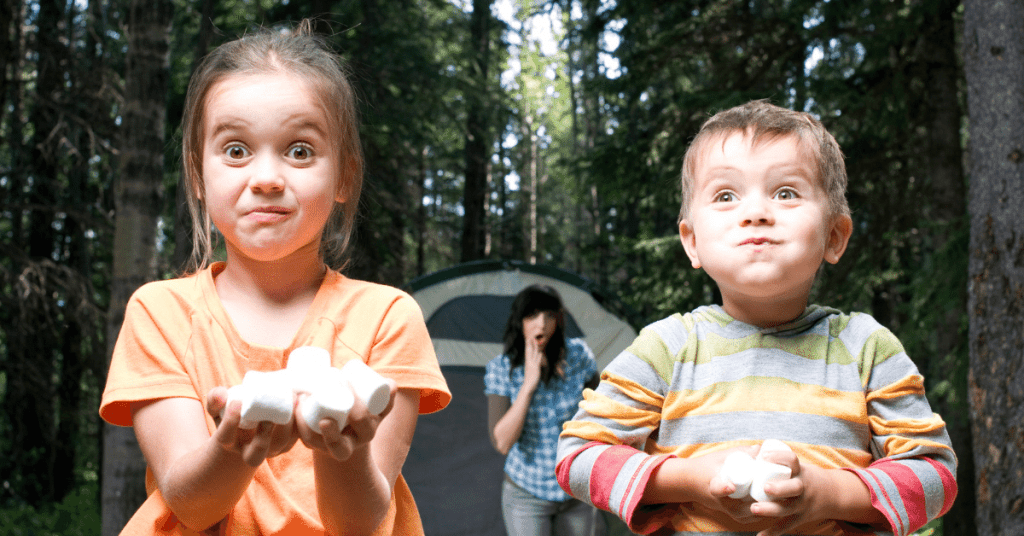How To Help a Child Develop Self Control
Welcome, fellow parents, to a guide on fostering self-control in our little ones. As our children navigate the world around them, developing self-control becomes a vital life skill.
Teaching self-control equips them with the ability to manage their emotions, resist impulsive behavior, and make thoughtful decisions. In this guide, we’ll explore effective strategies and engaging activities to help our children develop self-control in a nurturing and supportive environment.
Studying for school does not give immediate dopamine boost but getting good grades and being celebrated for your acheivments does. Investing money in stocks does not result in immediate reward but long-term smart investing can make a patient person rich.
Human beings naturally want immediate rewards and it can be difficult to push against these base desires, even as adults, give your child a head-start by establishing the concept of delayed gratification and helping them to develope self-control.
Do You Want One Now Or Two Later?

Self-control serves as a vital cornerstone in our children’s personal and social development. It goes beyond simply resisting temptation or suppressing immediate desires. By cultivating self-control in our little ones, we equip them with invaluable skills that will support them throughout their lives. With self-control, children gain the ability to make thoughtful decisions, manage their emotions effectively, and navigate complex social situations with grace.
One of the most renowned studies on self-control, the Marshmallow Experiment, conducted by psychologist Walter Mischel in the late 1960s and early 1970s, provides valuable insights into the development of self-control in children. In this experiment, children were offered a choice: they could either eat one marshmallow immediately or wait for a short period to receive two marshmallows as a reward. The researchers observed the children’s ability to delay gratification and tracked their long-term outcomes.
The Marshmallow Experiment revealed fascinating correlations between a child’s self-control and their future success. Those who displayed the ability to wait patiently for the second marshmallow demonstrated higher levels of self-control as they grew older. Moreover, these children exhibited better academic performance, higher SAT scores, and healthier relationships later in life.
The experiment teaches us several important lessons that we can apply in our parenting journey:
- Building Patience: The Marshmallow Experiment highlights the significance of teaching children to delay gratification. As parents, we can encourage patience by introducing activities that involve waiting, such as taking turns during playtime or waiting for a treat. By gradually increasing the waiting time and acknowledging their efforts, we help children develop the self-control needed to resist impulsive desires.
- Distraction and Distancing: The study also revealed that children who distracted themselves or found ways to distance themselves from the tempting marshmallow were more successful in delaying gratification. In parenting, we can help our children by teaching them strategies like redirecting their attention, engaging in an alternative activity, or mentally distancing themselves from immediate temptations. These techniques empower children to resist instant gratification and make more informed choices.
- Environmental Support: The Marshmallow Experiment demonstrates that a supportive environment plays a crucial role in fostering self-control. By creating consistent rules and routines at home, parents provide a structured framework that helps children understand expectations and develop self-discipline. Additionally, offering praise and recognition for small acts of self-control builds their confidence and motivation to continue practicing it.
- Teach Coping Skills: The ability to manage frustration and regulate emotions is closely linked to self-control. As parents, we can teach our children effective coping skills, such as deep breathing, counting to ten, or expressing emotions through words or art. These strategies help children navigate challenging situations with composure and make rational decisions instead of succumbing to impulsive reactions.
- Practice Makes Perfect: The Marshmallow Experiment reminds us that self-control is a learned skill that can be improved with practice. Encourage children to set small goals and celebrate their progress along the way. Provide them with opportunities to make choices and resist immediate desires, gradually building their self-control muscles.
Incorporating the lessons from the Marshmallow Experiment into our parenting approach allows us to guide our children in developing self-control. By fostering patience, teaching distraction techniques, creating a supportive environment, equipping them with coping skills, and embracing the concept of practice, we empower our children to make wiser decisions, regulate their emotions, and navigate life’s challenges with resilience and grace.
Teach Emotional Awareness

Emotional awareness is a fundamental aspect of developing self-control in children. By teaching our children to recognize and understand their emotions, we empower them to effectively manage and regulate their emotional responses. When children are aware of their feelings, they can make conscious choices about how to respond to different situations, rather than reacting impulsively. Encouraging open communication and creating a safe space for children to express their emotions fosters their emotional intelligence and self-control.
Parents can help children develop emotional awareness by labeling and validating their emotions. By using simple and age-appropriate language, we can teach them to identify and articulate their feelings. For example, we can say, “I can see that you’re feeling frustrated right now because your block tower fell down.” This validation helps children understand that their emotions are valid and normal.
Furthermore, teaching children calming techniques, such as deep breathing exercises, can provide them with practical tools to manage their emotions in challenging moments. Guiding them to take deep breaths and focusing on their breath helps them regain control and make more deliberate choices rather than acting impulsively.
By prioritizing emotional awareness, we equip our children with the ability to recognize their emotions, understand their triggers, and respond in ways that align with their values and goals. This skill empowers them to navigate conflicts, resolve issues, and make decisions from a place of self-control and empathy. As parents, let’s foster emotional intelligence by promoting open dialogue, validating feelings, and teaching coping strategies, thereby nurturing self-control and emotional well-being in our children.
The ‘Owl’ Exercise

The Owl Exercise is a fun and engaging activity that can help children practice and develop their self-control skills. It involves imitating the stillness and focus of an owl, a creature known for its unwavering concentration and patience. By participating in the Owl Exercise, children can learn to regulate their impulses, enhance their attention span, and strengthen their ability to stay calm and composed.
Here’s a step-by-step breakdown of how to conduct the Owl Exercise:
- Introduce the Concept: Begin by explaining the purpose and benefits of the Owl Exercise to your child. Emphasize that it is a fun way to practice self-control and focus, just like an owl.
- Find a Comfortable Space: Choose a quiet and comfortable space where your child can sit or stand without distractions. It could be in their room, a peaceful corner, or even outdoors.
- Set the Scene: Encourage your child to imagine themselves as an owl perched on a branch, keenly observing the surroundings. Describe the serene environment and guide their visualization process, fostering a sense of tranquility.
- Assume the Owl Pose: Instruct your child to assume the owl pose by standing tall or sitting upright. Ask them to maintain a still and focused posture, just like an owl on a branch.
- Encourage Deep Breathing: Guide your child to take slow, deep breaths, emphasizing the importance of breathing deeply to promote relaxation and concentration. Encourage them to inhale deeply through their nose and exhale slowly through their mouth.
- Practice Stillness: Encourage your child to remain still and composed, just like an owl observing its surroundings. Explain that the goal is to maintain their position and resist the urge to fidget or move impulsively.
- Set a Time Limit: Start with a short duration, such as one minute, and gradually increase the time as your child becomes more comfortable and skilled at maintaining their focus and stillness.
- Offer Support and Encouragement: During the exercise, provide gentle reminders to your child to stay focused and maintain their owl-like stillness. Offer positive reinforcement and praise for their efforts and self-control.
- Reflect and Discuss: After completing the Owl Exercise, engage in a discussion with your child. Ask them how they felt during the activity, what challenges they faced, and how they were able to overcome those challenges. Emphasize the importance of practicing self-control in various situations and relate it to real-life scenarios.
By regularly practicing the Owl Exercise, children can strengthen their self-control skills, improve their ability to concentrate, and develop a sense of inner calm. Encourage them to embrace their inner owl and enjoy the process of becoming more patient, focused, and self-disciplined.
Arts, Crafts, and Fun

Engaging in arts and crafts activities is a wonderful avenue for promoting self-control in children. Through creative expression, children learn to channel their emotions, focus their attention, and persevere through challenges. Arts and crafts provide a platform for children to explore their imagination, exercise patience, and develop fine motor skills while practicing self-control.
Encourage your child to engage in various art forms, such as drawing, painting, sculpting, or crafting. These activities require concentration and attention to detail, allowing children to immerse themselves in the creative process. As they work on their projects, they learn to regulate their impulses, maintain focus, and stay committed to completing their artwork.
Arts and crafts also provide an opportunity for children to manage frustration and overcome obstacles. When faced with artistic challenges, such as blending colors or shaping materials, children learn to persist and find solutions. They discover that mistakes are a natural part of the creative process and develop the ability to adapt and problem-solve, fostering resilience and self-control.
Introduce age-appropriate art techniques and materials that match your child’s abilities. Encourage them to follow instructions, pay attention to details, and take their time to create their artwork. Provide positive reinforcement and praise for their patience, effort, and ability to exercise self-control during the artistic process.
Display your child’s artwork and celebrate their achievements, reinforcing the idea that their creativity and self-control are valued. This boosts their confidence and motivates them to continue exploring artistic pursuits.
Consider engaging in collaborative art projects as a family, where everyone contributes to a shared creation. This cultivates teamwork, cooperation, and the practice of taking turns, while fostering a sense of shared accomplishment.
By incorporating arts and crafts into our children’s lives, we offer them an avenue to express themselves creatively and develop their self-control skills. Let’s provide them with the necessary materials, guidance, and encouragement to embark on artistic endeavors that nurture their imagination, patience, and ability to exercise self-discipline.
Other Parental Resources For Developing Self Control In Children

HealthyChildren.org
The American Academy of Pediatrics provides this service, which is backed by approximately 70,000 paediatricians and their expertise. From birth to young adulthood, this group assists parents in improving their children’s health. Parents can learn about all aspects of health, including physical, emotional, and social issues.
The Center for Parenting Education
The Center for Parenting Education is a resource centre dedicated to giving parenting materials and assistance. It includes articles, ideas, tools, and a resource directory meant to educate and support parents in raising emotionally healthy and well-adjusted children. Build effective parenting skills and learn to set limits while delivering unconditional love to your children, among other parenting subjects.
Growing Green Baby
Part of the inspiration for Growing Green Baby was the personal experience of being pregnant and wanting to find one place to see, feel, and try the items I would be using on my baby.
I knew I wanted options that were good for my baby’s health as well as good for the health of the earth. I wanted to cloth diaper but wanted simple choices to compare. I wanted to support locally made items in our community- so Growing Green Baby began and it is here to help everyone who was ever in my situation.
FAQ
How long does it take for a child to develop self-control?
The development of self-control in children varies and is influenced by various factors, including individual temperament and environmental factors. It is a gradual process that unfolds over time. With consistent guidance, practice, and reinforcement, children can begin developing self-control skills in their early years and continue to refine them throughout their childhood and adolescence.
What are some everyday situations where I can help my child practice self-control?
There are numerous everyday situations where you can help your child practice self-control. Some examples include waiting for their turn during playtime, managing their emotions when they are upset or frustrated, delaying gratification by saving allowance for a desired item, and following consistent routines and rules at home. Encouraging self-control during these situations helps children develop their abilities to regulate their impulses and make thoughtful choices.
How can I teach my child self-control without being overly strict?
Teaching self-control does not require being overly strict. Instead, focus on creating a nurturing and supportive environment that promotes self-control. Set clear and consistent rules, provide explanations for the reasons behind the rules, and offer choices within appropriate limits. Use positive reinforcement, specific praise, and rewards to acknowledge and encourage self-control. Maintain open communication and model self-control in your own behavior, serving as a positive example for your child.
What if my child struggles with self-control and becomes frustrated easily?
It is common for children to struggle with self-control, especially when they encounter challenges or become frustrated. In such situations, help your child identify and label their emotions. Teach them calming techniques like deep breathing or taking a short break to regain their composure. Encourage problem-solving and guide them in finding solutions. Provide reassurance and support, emphasizing that self-control is a skill that can be developed over time with practice and patience.
Are there any long-term benefits to helping my child develop self-control?
Yes, there are numerous long-term benefits to helping your child develop self-control. Research suggests that individuals with strong self-control skills tend to experience improved academic performance, healthier relationships, and greater overall success in various areas of life. They are better equipped to make thoughtful decisions, regulate their emotions, and navigate complex social situations. By investing in your child’s self-control development, you are providing them with a valuable foundation for future personal and professional growth.
Conclusion

As parents, we play a pivotal role in nurturing our children’s self-control. By understanding its importance, implementing effective strategies, and engaging in enjoyable activities, we can empower our children to develop self-control and flourish in various aspects of their lives. Remember, this is a journey that requires patience, consistency, and a whole lot of love. Together, we can help our children blossom into their best selves.








